heart support
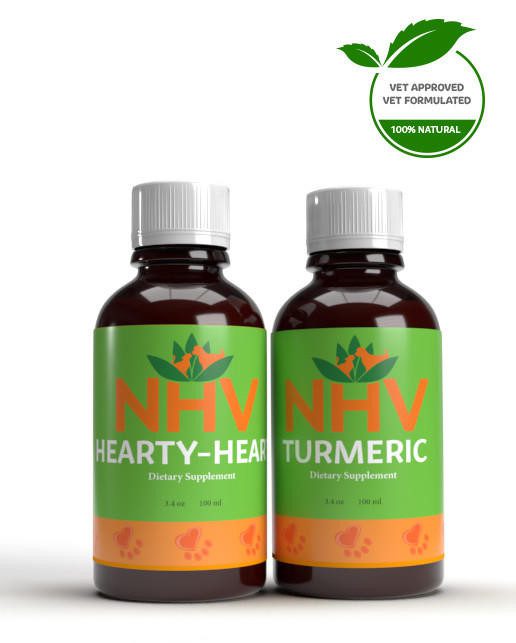
free shipping over $100 (USA & Canada)
1-877-937-4372 the pet expert hotline
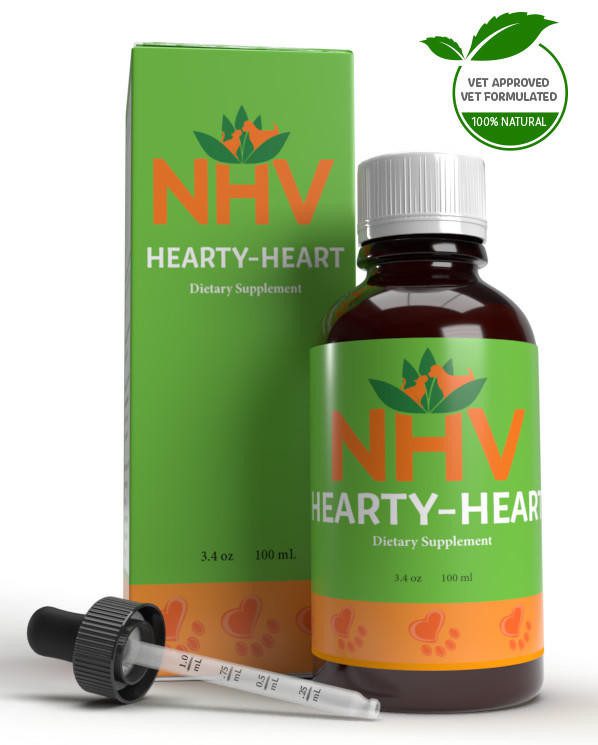

Heart health plays a crucial role in the overall well-being of our beloved pets. Among the most common heart conditions affecting dogs and, less frequently, cats is Myxomatous Mitral Valve Disease (MMVD). This progressive disease targets the mitral valve in the heart, leading to significant health challenges. This blog delves into MMVD in dogs and cats, offering a compassionate and detailed exploration of its symptoms, stages, diagnosis, and treatment options, alongside the benefits of NHV supplements for heart health.
In pets with MMVD, the valve thickens and loses its ability to close properly.
Myxomatous Mitral Valve Disease, also known as MMVD, is a degenerative condition that primarily affects the mitral valve in the heart. This valve, located between the left atrium and the left ventricle, plays a critical role in regulating blood flow. In pets with MMVD, the valve thickens and loses its ability to close properly. This results in blood leaking backward (regurgitation) into the left atrium, impairing the heart’s efficiency and increasing its workload.
MMVD is more common in dogs than cats, particularly in small and medium-sized breeds such as Cavalier King Charles Spaniels, Dachshunds, and Toy Poodles. While rare in cats, it can still occur, underscoring the importance of recognizing the disease across species. Without proper management, MMVD can lead to congestive heart failure (CHF), a potentially life-threatening condition.
The symptoms of Myxomatous Mitral Valve Disease can vary depending on its stage but may include:

Some pets may show subtle signs in the early stages, so routine veterinary check-ups are essential for early detection.
The exact cause of MMVD remains unknown, but several factors contribute to its development:
In cats, MMVD is less common, but congenital factors or other underlying health conditions might trigger its onset.
Veterinarians classify MMVD into four stages based on the progression of the disease:
Understanding these stages helps veterinarians tailor treatments to the individual needs of the pet.
Accurate diagnosis is vital to managing MMVD effectively. Common diagnostic tools include:
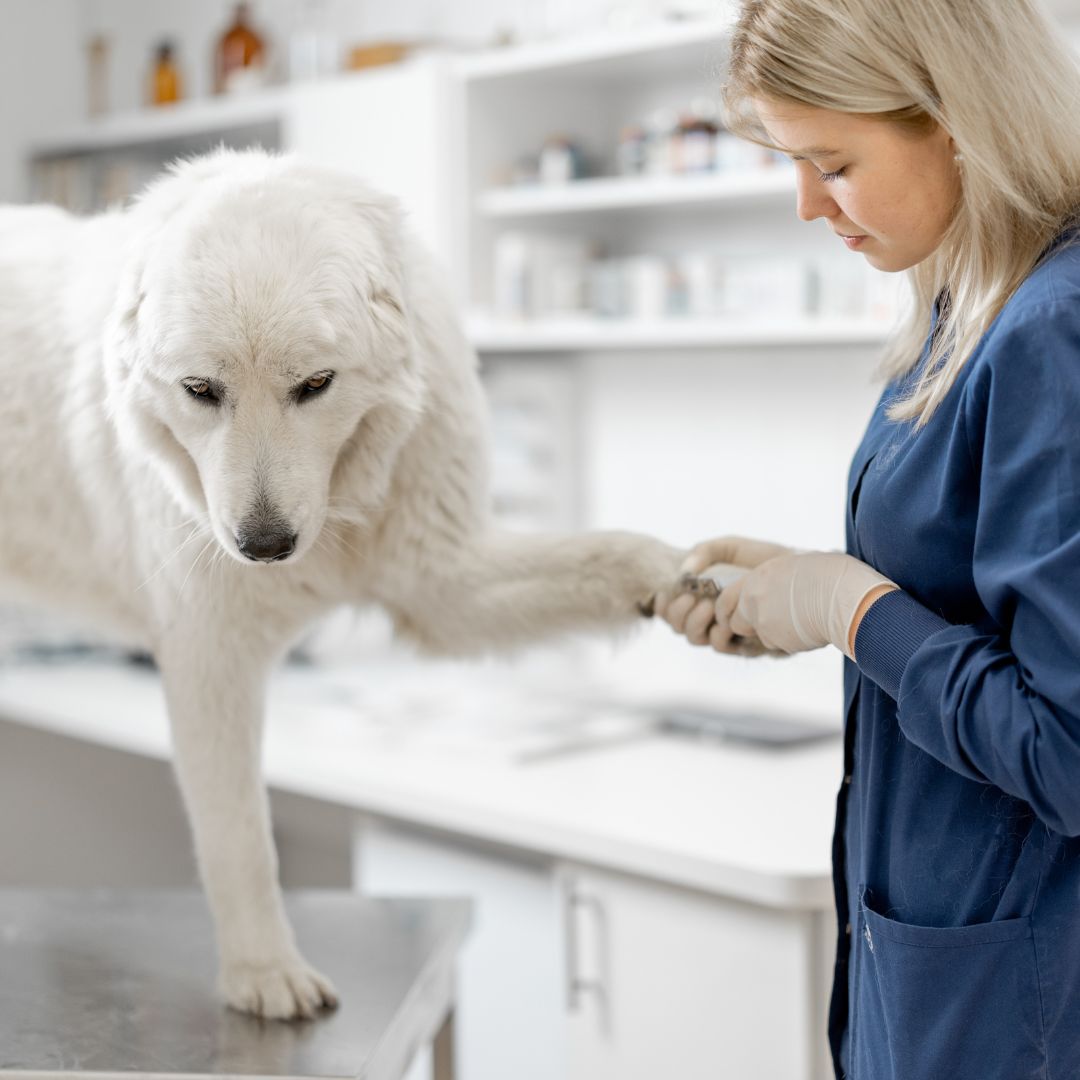
Regular monitoring with these tests ensures that the progression of MMVD is tracked, and treatments can be adjusted as needed.
While MMVD cannot be cured, various treatments can slow its progression and improve quality of life.
Some classes of medications that may be used are diuretics, which reduce fluid buildup in the lungs and abdomen. ACE inhibitors may be used to help relax blood vessels and lower blood pressure, reducing the heart’s workload. Finally, certain heart medications may be used to strengthen the heart muscles and improve its efficiency.
Holistic lifestyle adjustments for pets with MMVD include weight management and dietary changes. Maintaining a healthy weight can significantly reduce the heart’s workload. Dietary changes, including low-sodium diets and heart-supportive foods can benefit pets with MMVD. Consult an expert pet nutritionist and your veterinarian before making diet changes for pets with special needs.
Frequent monitoring and timely adjustments to treatment plans are crucial in managing the disease effectively.
NHV Natural Pet Products offers several supplements that can support pets with Myxomatous Mitral Valve Disease. These natural, holistic solutions can complement veterinary treatments and enhance overall well-being:
NHV supplements are easy to administer, either directly into your pet’s mouth or mixed with their food.
Myxomatous Mitral Valve Disease in dogs and cats is a challenging condition, but with early detection, proper management, and holistic support, pets can continue to live fulfilling lives. NHV Natural Pet Products provides safe, effective supplements that can enhance traditional treatments, helping pets with MMVD maintain their health and vitality.
If your pet shows signs of heart issues or has been diagnosed with MMVD, consult your veterinarian and consider incorporating NHV’s natural solutions to support their journey to better heart health.
heart support

Hearty-Heart & Turmeric
bundle and save with pet expert kits
3 month supply for a small to medium size pet.
What is it?
NHV Cardiovascular Super Support Health Kit offers natural support for cardiovascular or heart disease for furkiddos by managing symptoms of cardiovascular disorders.
How Does it Work?
Why Should I Trust It?
Made with organically grown or ethically harvested (or ethically sourced) herbs.


What is it?
NHV Cardiovascular Super Support Health Kit offers natural support for cardiovascular or heart disease for furkiddos by managing symptoms of cardiovascular disorders.
How Does it Work?
Why Should I Trust It?
Made with organically grown or ethically harvested (or ethically sourced) herbs.

Seeing your little one battling cardiovascular and heart disease in dogs and cats is distressing and worrying. We understand that it is impossible just to stand and watch them suffer. That’s why our Pet Experts have bundled two natural supplements that work together and can be used alongside traditional medication as extra support for your little one.
Our Cardiovascular Super Support Health Kit can help support the cardiovascular system, alleviate heart disease symptoms, and reduce any discomfort heart conditions may cause. This bundle contains our primary support for heart health in furkiddos - Hearty Heart and Turmeric, which offers excellent antioxidant and cardiovascular support.
All our supplements are free of added preservatives, additives, flavorings, or artificial colors. They are veterinarian formulated, and have been used by pets worldwide for over twenty years.
What is Cardiovascular (Heart) Disease in Dogs and Cats?
Cardiovascular (cardiac) disease is an umbrella term for conditions in your furkid’s circulatory system (blood vessels and especially the heart). Because of this, they are also commonly known as heart diseases.
Over 10% of furkiddos have some kind of cardiovascular disease. Unfortunately, the diseases progress over time if not treated in the early stages. This may eventually lead to heart failure and may even be fatal. That’s why seeking help from veterinary cardiologists is important. You should also visit a vet as soon as you notice clinical signs of heart disease in your beloved furkid.
Symptoms of Cardiovascular (Heart) Disease in Dogs and Cats
There are many types of cardiovascular disease in dogs and cats, and they all show different, particular symptoms. The symptoms may also vary in various breeds and species.
But here are some general signs you should watch out for:
Discovering, diagnosing, and treating heart disease sooner can help minimize the damage it causes to your cat or dog’s heart. So, we would like to reiterate the importance of vet consultation and full body examination upon seeing these symptoms.
Common Cardiovascular (Heart) Disease in Dogs and Cats
Let’s learn some common types of heart disease or cardiovascular disease in dogs and cats:
Sadly, most heart disease in cats and dogs are incurable. But with treatment and natural support, you can help your little one live a longer and happier life!
How NHV Remedies Support Cardiovascular Disease in Dogs and Cats
Our Cardiovascular Super Support Health Kit can support your little one while taking vet-prescribed medication.
Hearty-Heart, as the name suggests, is our primary support for cardiovascular or heart disease in cats and dogs. The extract supports furkiddos’ cardiovascular system, promotes heart health, and helps with symptoms of cardiovascular disease. The herbs in this formula are well known to help with various heart related symptoms. For example, the herb Pulsatilla helps relieve the constant coughing, restlessness, and respiratory issues that furkids with cardiac disease may experience.
Various other herbs in the supplement, like motherwort, help strengthen your little one’s heart and circulatory system. Hawthorn, in particular, is a well-known heart and vascular tonic. It is often recommended for furriends with heart disease. This herb also may strengthen cardiovascular structures and functions. All the herbs work synergistically to create a balanced formula that is safe to use long-term to support the cardiovascular system.
Another supplement added to the kit is Turmeric. Turmeric is also beneficial for cardiovascular health. The main compound in Turmeric is called curcumin. In addition to supporting the cardiovascular system, curcumin is high in antioxidant properties and may be helpful in scavenging free radicals as well as helping to reduce inflammation.
And what does inflammation have to do with cardiac health?
Inflammation is one of the risk factors for cardiovascular disorders because it may cause blood clots. Therefore, if we reduce inflammation in our furriends, it may protect them from having cardiovascular disease too. That’s why Turmeric can serve as a proactive support for heart disease in dogs and cats.
Hearty-Heart
Turmeric
Natural Support for Cardiovascular (Heart) Disease in Dogs and Cats
NHV’s supplements are all manufactured in a GMP-certified and FDA-approved facility. In addition to that, a third-party lab has tested them for quality assurance. Therefore, you can rest assured that our products are safe for your little one.
We understand that your furbaby’s health and well-being are your top priorities. It is ours too. Because of that, we have a very dedicated and supportive team of pet experts to help. Feel free to connect with one of NHV’s pet experts if you have any questions at all!
Grappling with cardiovascular disorders can be very tough on your furkiddo. Order our Cardiovascular Super Support Health Kit right now to support their fight!
All NHV supplements are made with the finest quality organic or ethically harvested herbs. We use non-GMO vegetable glycerin as our base. NHV products are full-spectrum extracts.
Hearty-Heart
Turmeric
Select your pet's weight to determine the correct dose.
To be taken twice daily. Determine your pet’s weight and then use the easy chart below to determine the correct dose. This is the minimum dosage.
Pet's Weight Dosage For Dogs and Cats
0 - 15 lb = 0.5 ml
16 - 30 lb = 1.0 ml
31 - 45 lb = 1.5 ml
46 - 60 lb = 2.0 ml
61 - 75 lb = 2.5 ml
Over 75 lb = 3.0 ml
For ferrets: 0.5ml twice a day
For rabbits and guinea pigs: 0.5 ml twice a day
For hamsters and mice: 1 drop per two pounds twice a day
How to Administer
Shake well before use. The easiest method is to use the dropper provided and place the drops into your pet’s food or favorite treat. You can also use the dropper and squirt directly into the pet’s mouth. Some pets can be finicky, if this occurs consider hiding the drops in foods most pet’s love such as fish, chicken or yogurt or a favorite treat. If your pet only eats dry food then soak a few kibbles at feeding time.
For Best Results
Herbal dietary supplements are beneficial to the health and well-being of your pet and are safe for long-term use. Every pet responds to natural herbal supplements differently, therefore it is important to be consistent and administer the product daily. Supplements generally take two to four weeks to take effect, however this will vary from one animal to the next.
Product Storage
All NHV Natural Pet Products are pure herbal extracts and contain no artificial additives, preservatives or coloring. Shelf life after opening is 6 months and must be refrigerated after opening.
All information provided by NHV Natural Pet Products is for educational purposes only.
Seeing your little one battling cardiovascular and heart disease in dogs and cats is distressing and worrying. We understand that it is impossible just to stand and watch them suffer. That’s why our Pet Experts have bundled two natural supplements that work together and can be used alongside traditional medication as extra support for your little one.
Our Cardiovascular Super Support Health Kit can help support the cardiovascular system, alleviate heart disease symptoms, and reduce any discomfort heart conditions may cause. This bundle contains our primary support for heart health in furkiddos - Hearty Heart and Turmeric, which offers excellent antioxidant and cardiovascular support.
All our supplements are free of added preservatives, additives, flavorings, or artificial colors. They are veterinarian formulated, and have been used by pets worldwide for over twenty years.
What is Cardiovascular (Heart) Disease in Dogs and Cats?
Cardiovascular (cardiac) disease is an umbrella term for conditions in your furkid’s circulatory system (blood vessels and especially the heart). Because of this, they are also commonly known as heart diseases.
Over 10% of furkiddos have some kind of cardiovascular disease. Unfortunately, the diseases progress over time if not treated in the early stages. This may eventually lead to heart failure and may even be fatal. That’s why seeking help from veterinary cardiologists is important. You should also visit a vet as soon as you notice clinical signs of heart disease in your beloved furkid.
Symptoms of Cardiovascular (Heart) Disease in Dogs and Cats
There are many types of cardiovascular disease in dogs and cats, and they all show different, particular symptoms. The symptoms may also vary in various breeds and species.
But here are some general signs you should watch out for:
Discovering, diagnosing, and treating heart disease sooner can help minimize the damage it causes to your cat or dog’s heart. So, we would like to reiterate the importance of vet consultation and full body examination upon seeing these symptoms.
Common Cardiovascular (Heart) Disease in Dogs and Cats
Let’s learn some common types of heart disease or cardiovascular disease in dogs and cats:
Sadly, most heart disease in cats and dogs are incurable. But with treatment and natural support, you can help your little one live a longer and happier life!
How NHV Remedies Support Cardiovascular Disease in Dogs and Cats
Our Cardiovascular Super Support Health Kit can support your little one while taking vet-prescribed medication.
Hearty-Heart, as the name suggests, is our primary support for cardiovascular or heart disease in cats and dogs. The extract supports furkiddos’ cardiovascular system, promotes heart health, and helps with symptoms of cardiovascular disease. The herbs in this formula are well known to help with various heart related symptoms. For example, the herb Pulsatilla helps relieve the constant coughing, restlessness, and respiratory issues that furkids with cardiac disease may experience.
Various other herbs in the supplement, like motherwort, help strengthen your little one’s heart and circulatory system. Hawthorn, in particular, is a well-known heart and vascular tonic. It is often recommended for furriends with heart disease. This herb also may strengthen cardiovascular structures and functions. All the herbs work synergistically to create a balanced formula that is safe to use long-term to support the cardiovascular system.
Another supplement added to the kit is Turmeric. Turmeric is also beneficial for cardiovascular health. The main compound in Turmeric is called curcumin. In addition to supporting the cardiovascular system, curcumin is high in antioxidant properties and may be helpful in scavenging free radicals as well as helping to reduce inflammation.
And what does inflammation have to do with cardiac health?
Inflammation is one of the risk factors for cardiovascular disorders because it may cause blood clots. Therefore, if we reduce inflammation in our furriends, it may protect them from having cardiovascular disease too. That’s why Turmeric can serve as a proactive support for heart disease in dogs and cats.
Hearty-Heart
Turmeric
Natural Support for Cardiovascular (Heart) Disease in Dogs and Cats
NHV’s supplements are all manufactured in a GMP-certified and FDA-approved facility. In addition to that, a third-party lab has tested them for quality assurance. Therefore, you can rest assured that our products are safe for your little one.
We understand that your furbaby’s health and well-being are your top priorities. It is ours too. Because of that, we have a very dedicated and supportive team of pet experts to help. Feel free to connect with one of NHV’s pet experts if you have any questions at all!
Grappling with cardiovascular disorders can be very tough on your furkiddo. Order our Cardiovascular Super Support Health Kit right now to support their fight!
All NHV supplements are made with the finest quality organic or ethically harvested herbs. We use non-GMO vegetable glycerin as our base. NHV products are full-spectrum extracts.
Hearty-Heart
Turmeric
Select your pet's weight to determine the correct dose.
To be taken twice daily. Determine your pet’s weight and then use the easy chart below to determine the correct dose. This is the minimum dosage.
Pet's Weight Dosage For Dogs and Cats
0 - 15 lb = 0.5 ml
16 - 30 lb = 1.0 ml
31 - 45 lb = 1.5 ml
46 - 60 lb = 2.0 ml
61 - 75 lb = 2.5 ml
Over 75 lb = 3.0 ml
For ferrets: 0.5ml twice a day
For rabbits and guinea pigs: 0.5 ml twice a day
For hamsters and mice: 1 drop per two pounds twice a day
How to Administer
Shake well before use. The easiest method is to use the dropper provided and place the drops into your pet’s food or favorite treat. You can also use the dropper and squirt directly into the pet’s mouth. Some pets can be finicky, if this occurs consider hiding the drops in foods most pet’s love such as fish, chicken or yogurt or a favorite treat. If your pet only eats dry food then soak a few kibbles at feeding time.
For Best Results
Herbal dietary supplements are beneficial to the health and well-being of your pet and are safe for long-term use. Every pet responds to natural herbal supplements differently, therefore it is important to be consistent and administer the product daily. Supplements generally take two to four weeks to take effect, however this will vary from one animal to the next.
Product Storage
All NHV Natural Pet Products are pure herbal extracts and contain no artificial additives, preservatives or coloring. Shelf life after opening is 6 months and must be refrigerated after opening.
All information provided by NHV Natural Pet Products is for educational purposes only.
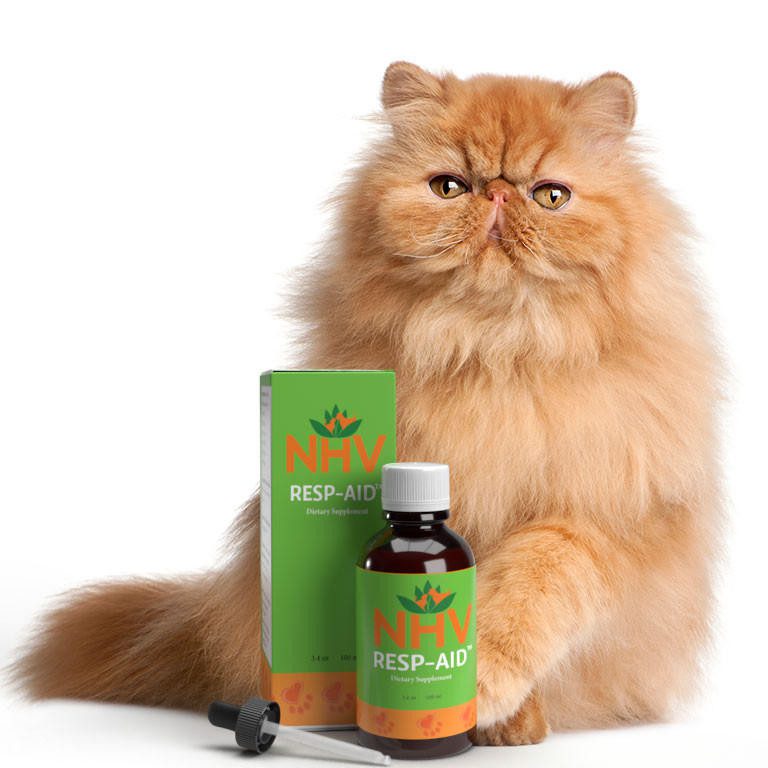
Resp Aid- helps support health respiratory function

Resp Aid- helps support health respiratory function
overall vitality
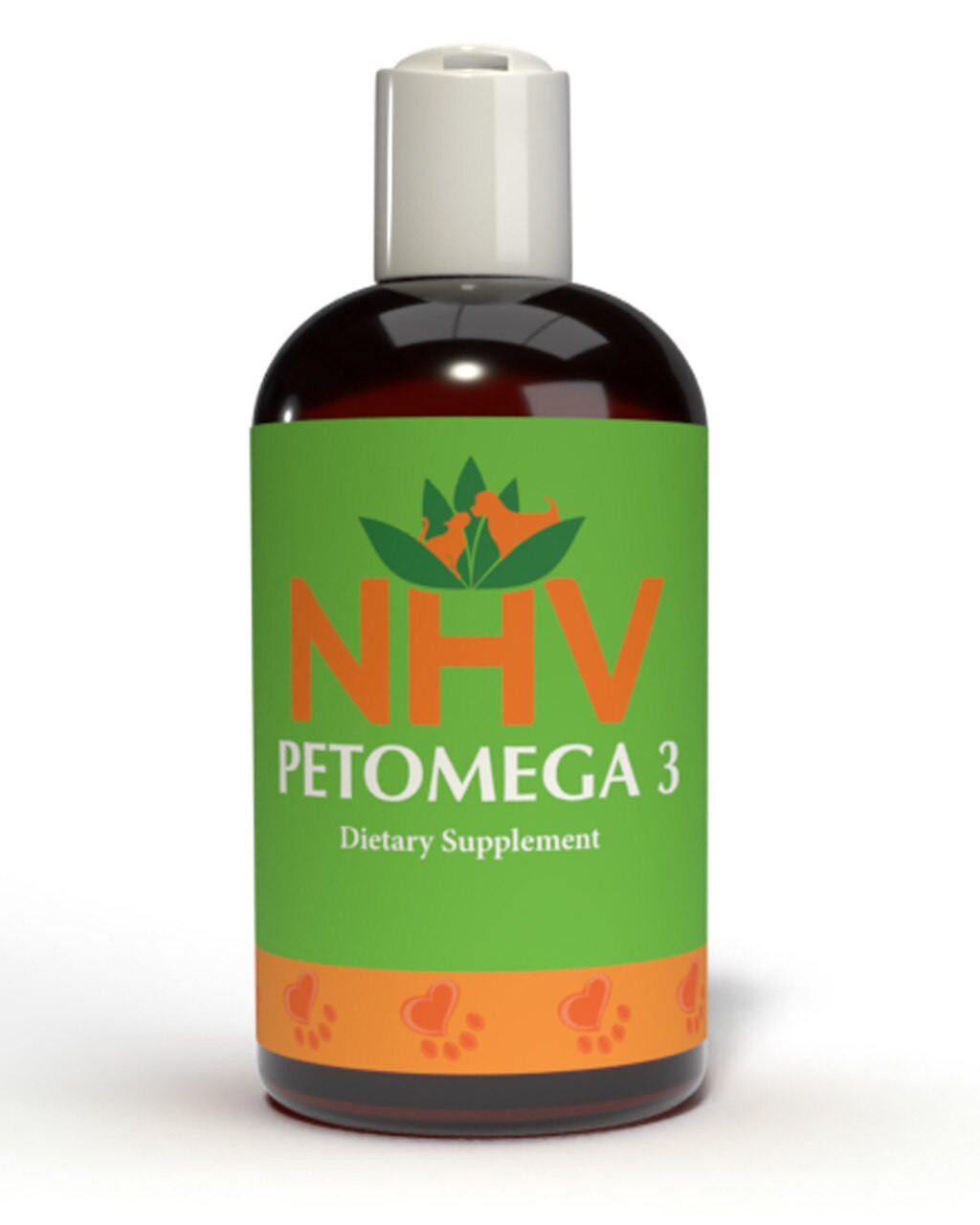
For Overall Health and Well-Being
buy 2 and save $3
What is it?
Support your dog’s health with omega-3 fish oil for dogs, promoting a healthy coat, eyes, joints, immune system, and overall organ function.
How does it work?
Why trust it?
NHV Petomega 3 has earned 5-star ratings by pet parents from around the world.


What is it?
Support your dog’s health with omega-3 fish oil for dogs, promoting a healthy coat, eyes, joints, immune system, and overall organ function.
How does it work?
Why trust it?
NHV Petomega 3 has earned 5-star ratings by pet parents from around the world.

Our omega 3 fish oil for dogs is a great source of EPA (Eicosapentaenoic Acid 600mg) and DHA (Docosahexaenoic acid 460mg) essential fatty acids. This fish oil supplement for dogs is derived from sardines, anchovies and North Atlantic cod liver oil. It is molecularly distilled and cold pressed to improve the bioavailability of the omega 3 fatty acids, and is medical and human grade quality.
Omega 3 fish oil for dogs may be beneficial for the following:
Processed pet foods have increased omega-6 fatty acids, and decreased omega-3 fatty acids. The University of Maryland Medical Center states, "It is very important to maintain a balance between omega-3 and omega-6 fatty acids in the diet. A proper balance helps maintain and even improve health." Your dog’s body cannot easily make essential fatty acids. It is vital to provide omega 3 fish oil for dogs as an added supplement to your pet’s daily diet.
The American Journal of Veterinary Medicine has published studies on the benefits of omega 3 fatty acids (fish oils) for arthritis and degenerative joint disease in dogs. The studies showed that dogs who were given omega 3 fatty acids had a significantly improved ability to get up from a resting position and marked improvement in walking ability.
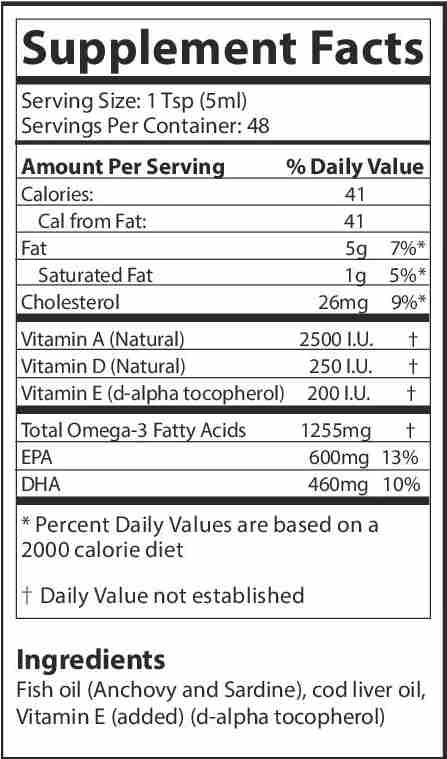
Suggested Dosage: To be taken once per day. Add to food based on weight chart.
Therapeutic Dosage: Double the quantity for maximum period of 4 weeks or follow veterinarian advise.
Pet’s Weight Dosage
0-15 lb = ¼ tsp
15-30 lb = ½ tsp
30-60 lb = 1 tsp
60-90 lb = 1 ½ tsp
How to Administer: Shake well before use. The easiest method is to add the dosage to your pets food. Some pets can be finicky, if this occurs consider hiding the appropriate amount in food most pet’s love such as fish, chicken, yogurt, or a favorite treat. If your pet only eats dry food then soak kibbles at feeding time.
For Best Results
Dietary supplements are beneficial to the health and well-being of your pet and are safe for long-term use. Every pet responds to natural supplements differently, therefore it is important to be consistent and administer the product daily. Supplements generally take two to four weeks to take effect, however this will vary from one animal to the next.
Product Storage
All NHV Natural Pet Products contain no artificial additives, preservatives or coloring. Shelf life after opening is 6 months and must be refrigerated after opening.
Cautions and Contraindications
Avoid During Pregnancy.
Our omega 3 fish oil for dogs is a great source of EPA (Eicosapentaenoic Acid 600mg) and DHA (Docosahexaenoic acid 460mg) essential fatty acids. This fish oil supplement for dogs is derived from sardines, anchovies and North Atlantic cod liver oil. It is molecularly distilled and cold pressed to improve the bioavailability of the omega 3 fatty acids, and is medical and human grade quality.
Omega 3 fish oil for dogs may be beneficial for the following:
Processed pet foods have increased omega-6 fatty acids, and decreased omega-3 fatty acids. The University of Maryland Medical Center states, "It is very important to maintain a balance between omega-3 and omega-6 fatty acids in the diet. A proper balance helps maintain and even improve health." Your dog’s body cannot easily make essential fatty acids. It is vital to provide omega 3 fish oil for dogs as an added supplement to your pet’s daily diet.
The American Journal of Veterinary Medicine has published studies on the benefits of omega 3 fatty acids (fish oils) for arthritis and degenerative joint disease in dogs. The studies showed that dogs who were given omega 3 fatty acids had a significantly improved ability to get up from a resting position and marked improvement in walking ability.

Suggested Dosage: To be taken once per day. Add to food based on weight chart.
Therapeutic Dosage: Double the quantity for maximum period of 4 weeks or follow veterinarian advise.
Pet’s Weight Dosage
0-15 lb = ¼ tsp
15-30 lb = ½ tsp
30-60 lb = 1 tsp
60-90 lb = 1 ½ tsp
How to Administer: Shake well before use. The easiest method is to add the dosage to your pets food. Some pets can be finicky, if this occurs consider hiding the appropriate amount in food most pet’s love such as fish, chicken, yogurt, or a favorite treat. If your pet only eats dry food then soak kibbles at feeding time.
For Best Results
Dietary supplements are beneficial to the health and well-being of your pet and are safe for long-term use. Every pet responds to natural supplements differently, therefore it is important to be consistent and administer the product daily. Supplements generally take two to four weeks to take effect, however this will vary from one animal to the next.
Product Storage
All NHV Natural Pet Products contain no artificial additives, preservatives or coloring. Shelf life after opening is 6 months and must be refrigerated after opening.
Cautions and Contraindications
Avoid During Pregnancy.
Published: December 11, 2024